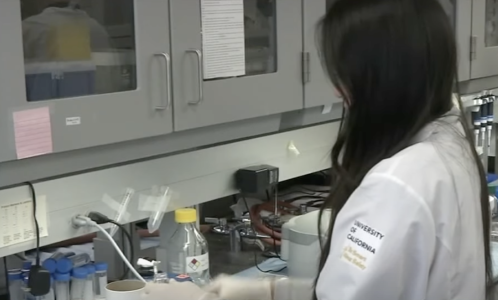Is your health at risk? Learn how these alarming budget cuts could affect you!
- Replies 0
The National Institutes of Health (NIH) has long been a beacon of hope and innovation in the medical world, leading the charge against diseases that touch the lives of millions.
But recent developments suggest that this vital institution—and the health of countless Americans—may be facing an unprecedented threat.
As members of The GrayVine community, it's crucial to understand how these potential changes could impact your well-being and the future of medical research.
The NIH: A Pillar of Medical Progress Under Siege
The NIH is a massive organization with an annual budget of $47 billion. It consists of 27 different institutes and centers and is located on a 300-acre campus in Bethesda, Maryland.
As the leading global supporter of biomedical research, the NIH has played a key role in major medical advancements.
Dr. Francis Collins notes that over the past four decades, heart disease-related deaths have decreased by 75%, thanks to the NIH.
Additionally, the agency has been instrumental in developing life-saving antiretroviral drugs for HIV/AIDS and treatments for stroke.

"Every dollar that NIH gave out in 2024 to a grant is estimated to have returned $2.46 just in a year. That's a pretty … good return on investment," Collins said.
A 2023 study in the Journal of the American Medical Association revealed that 99% of drugs approved by the FDA from 2010 to 2019 were linked to NIH-funded research or development.
Collins noted that over 80% of the NIH’s budget supports external universities and research institutions rather than internal operations.
"They're the ones that do the work, but they get the funds from NIH by writing very compelling grant applications that go through the most rigorous peer review system in the world," Collins said.
Also read: Is Trump's immigration crackdown forcing American elderly into crisis? Find out how
However, when President Trump assumed office in January, he tasked the Department of Government Efficiency (DOGE) with reducing the size of the federal government.
Since then, the National Institutes of Health (NIH), the world’s top biomedical research funder, has laid off 1,300 workers and cut over $2 billion in federal research grants.
Dr. Collins, who directed the agency for 12 years across three administrations, warns that this drastic reduction could harm Americans’ health for decades.
"When you're talking about medical research, when you're talking about people's lives, when you're talking about clinical trials for Alzheimer's disease or cancer that may take three or four years, you can't just go in and decide, 'I'm going to shut those down and maybe I'll try something else.' Those are people's lives at risk," Collins said.
Source: PBS NewsHour / Youtube.
The Ripple Effect of Budget Cuts
In the weeks following the inauguration, the Trump administration moved swiftly to curb federal spending. At the NIH, Dr. Francis Collins said staff were told to halt new projects and supply orders were restricted.
"They put a $1 limit on what you could order. There's not much you can order for $1," Collins said.
NIH insiders told 60 Minutes that even after a six-week freeze was lifted, some shelves and refrigerators remained empty because many supply staff had been let go.
One physician-scientist, requesting anonymity, said fear of job loss kept employees quiet. "You can't run an organization as complicated as NIH without a support system," the insider said. "Doctors, nurses, and scientists need an entire infrastructure—and that has now been decimated."
You might be interested: Is this medication at risk? RFK Jr.’s controversial claim could affect millions—here’s what you need to know
Morale reportedly plummeted in February when over 1,000 probationary employees were placed on leave, leading to immediate concerns about patient care and research operations. "This didn't come from within NIH; it came from outside. They don't know what these people do," the insider added.
Some dismissed staff have since returned, while others are still being paid but barred from working.
Earlier this month, a leaked proposal revealed plans to slash the NIH budget by more than 40%—about $20 billion—the largest proposed cut to the agency to date. While prior administrations under Presidents George W. Bush and Obama made modest cuts, this move sent shockwaves through the scientific community.
Dr. Jay Bhattacharya, a former Stanford professor known for his views against pandemic lockdowns and mandates, was confirmed as the new NIH director late last month.

He declined a 60 Minutes interview but outlined his vision during his Senate confirmation hearing.
During his confirmation hearing, he stated, "If confirmed, I will carry out President Trump and Secretary Kennedy's agenda of committing the NIH to address the dire chronic health needs of the country with gold standard science and innovation."
Bhattacharya explained that one key initiative under this agenda is the creation of a new database to study chronic diseases.
Additionally, in response to a request from HHS Secretary Robert F. Kennedy, the NIH will allocate $50 million to autism research—a topic Kennedy has long debated with scientists.
"Scientific progress on this has been slow because scientists are frankly scared to ask the question," Bhattacharya said at a press conference. "The goal of my leadership is to make it so those questions are no longer taboo among scientists."
He recently told NIH advisers he is working to reverse some of the agency’s recent "disruptions," describing the proposed 40% budget cut as "the beginning of a negotiation."
A leaked draft budget also reveals plans to consolidate NIH institutes into eight and eliminate four others.
The Possible “Brain Drain”
Kristin Weinstein, a University of Washington doctoral candidate, has spent a decade studying cancer and autoimmunity.
Source: MSNBC / Youtube.
She had hoped to continue her research in the US after graduation but now, due to widespread hiring freezes at major universities, she and her family are considering leaving the country. "It's in some ways bleak," Weinstein said.
She’s not alone—a Nature survey of 1,600 scientists found that 75% are considering relocating abroad. Countries like Australia, China, and European nations have already ramped up recruitment efforts to attract displaced researchers.
Source: KENS 5 / Youtube.
Researchers Affected Across the US
Uncertainty at the NIH has stalled work at many of the 2,500 universities and institutions that depend on its funding.
Scientists report that projects on HIV/AIDS, trans health, and COVID-19 were abruptly canceled after being deemed misaligned with "agency priorities."

Last week, the NIH announced further restrictions: universities with DEI programs or those boycotting Israeli companies may lose NIH grants—or have existing funding revoked.
Patients and Trials: The Human Cost
Beth Humphrey, a 68-year-old grandmother with Alzheimer’s, joined an NIH-funded study run by Duke and UNC. "It has made me feel a little more empowered against the disease," she said. "It is sort of my way to fight back."
But her study is now at risk. The Trump administration aims to slash "indirect costs"—funds universities use for overhead like facilities and administration.
Critics call these expenses slush funds, while universities argue they’re essential for maintaining labs and brain banks.
Source: Katie Couric / Youtube.
Twenty-two states, including North Carolina, are fighting the policy in court. For patients like Humphrey, the upheaval at NIH is deeply unsettling.
"When that hope of a possible treatment is taken away, you're left with nothing but the disease," she said. "And there really needs to be hope."
In earlier news: Ex-top NIH official admits funding controversial research, then resigns!

Have you or a loved one benefited from NIH-funded research? Are you concerned about the potential impact of these budget cuts? Share your stories and thoughts in the comments below!
But recent developments suggest that this vital institution—and the health of countless Americans—may be facing an unprecedented threat.
As members of The GrayVine community, it's crucial to understand how these potential changes could impact your well-being and the future of medical research.
The NIH: A Pillar of Medical Progress Under Siege
The NIH is a massive organization with an annual budget of $47 billion. It consists of 27 different institutes and centers and is located on a 300-acre campus in Bethesda, Maryland.
As the leading global supporter of biomedical research, the NIH has played a key role in major medical advancements.
Dr. Francis Collins notes that over the past four decades, heart disease-related deaths have decreased by 75%, thanks to the NIH.
Additionally, the agency has been instrumental in developing life-saving antiretroviral drugs for HIV/AIDS and treatments for stroke.

The National Institutes of Health (NIH) has faced significant cuts under President Trump, impacting critical medical research and potentially the health of Americans. Image source: MSNBC / Youtube.
"Every dollar that NIH gave out in 2024 to a grant is estimated to have returned $2.46 just in a year. That's a pretty … good return on investment," Collins said.
A 2023 study in the Journal of the American Medical Association revealed that 99% of drugs approved by the FDA from 2010 to 2019 were linked to NIH-funded research or development.
Collins noted that over 80% of the NIH’s budget supports external universities and research institutions rather than internal operations.
"They're the ones that do the work, but they get the funds from NIH by writing very compelling grant applications that go through the most rigorous peer review system in the world," Collins said.
Also read: Is Trump's immigration crackdown forcing American elderly into crisis? Find out how
However, when President Trump assumed office in January, he tasked the Department of Government Efficiency (DOGE) with reducing the size of the federal government.
Since then, the National Institutes of Health (NIH), the world’s top biomedical research funder, has laid off 1,300 workers and cut over $2 billion in federal research grants.
Dr. Collins, who directed the agency for 12 years across three administrations, warns that this drastic reduction could harm Americans’ health for decades.
"When you're talking about medical research, when you're talking about people's lives, when you're talking about clinical trials for Alzheimer's disease or cancer that may take three or four years, you can't just go in and decide, 'I'm going to shut those down and maybe I'll try something else.' Those are people's lives at risk," Collins said.
Source: PBS NewsHour / Youtube.
The Ripple Effect of Budget Cuts
In the weeks following the inauguration, the Trump administration moved swiftly to curb federal spending. At the NIH, Dr. Francis Collins said staff were told to halt new projects and supply orders were restricted.
"They put a $1 limit on what you could order. There's not much you can order for $1," Collins said.
NIH insiders told 60 Minutes that even after a six-week freeze was lifted, some shelves and refrigerators remained empty because many supply staff had been let go.
One physician-scientist, requesting anonymity, said fear of job loss kept employees quiet. "You can't run an organization as complicated as NIH without a support system," the insider said. "Doctors, nurses, and scientists need an entire infrastructure—and that has now been decimated."
You might be interested: Is this medication at risk? RFK Jr.’s controversial claim could affect millions—here’s what you need to know
Morale reportedly plummeted in February when over 1,000 probationary employees were placed on leave, leading to immediate concerns about patient care and research operations. "This didn't come from within NIH; it came from outside. They don't know what these people do," the insider added.
Some dismissed staff have since returned, while others are still being paid but barred from working.
Earlier this month, a leaked proposal revealed plans to slash the NIH budget by more than 40%—about $20 billion—the largest proposed cut to the agency to date. While prior administrations under Presidents George W. Bush and Obama made modest cuts, this move sent shockwaves through the scientific community.
Dr. Jay Bhattacharya, a former Stanford professor known for his views against pandemic lockdowns and mandates, was confirmed as the new NIH director late last month.

The NIH is the world's largest funder of biomedical research, with its work contributing to major breakthroughs in diseases such as heart disease and HIV/AIDS. Image source: ABC7 News Bay Area / Youtube.
He declined a 60 Minutes interview but outlined his vision during his Senate confirmation hearing.
During his confirmation hearing, he stated, "If confirmed, I will carry out President Trump and Secretary Kennedy's agenda of committing the NIH to address the dire chronic health needs of the country with gold standard science and innovation."
Bhattacharya explained that one key initiative under this agenda is the creation of a new database to study chronic diseases.
Additionally, in response to a request from HHS Secretary Robert F. Kennedy, the NIH will allocate $50 million to autism research—a topic Kennedy has long debated with scientists.
"Scientific progress on this has been slow because scientists are frankly scared to ask the question," Bhattacharya said at a press conference. "The goal of my leadership is to make it so those questions are no longer taboo among scientists."
He recently told NIH advisers he is working to reverse some of the agency’s recent "disruptions," describing the proposed 40% budget cut as "the beginning of a negotiation."
A leaked draft budget also reveals plans to consolidate NIH institutes into eight and eliminate four others.
The Possible “Brain Drain”
Kristin Weinstein, a University of Washington doctoral candidate, has spent a decade studying cancer and autoimmunity.
Source: MSNBC / Youtube.
She had hoped to continue her research in the US after graduation but now, due to widespread hiring freezes at major universities, she and her family are considering leaving the country. "It's in some ways bleak," Weinstein said.
She’s not alone—a Nature survey of 1,600 scientists found that 75% are considering relocating abroad. Countries like Australia, China, and European nations have already ramped up recruitment efforts to attract displaced researchers.
Source: KENS 5 / Youtube.
Researchers Affected Across the US
Uncertainty at the NIH has stalled work at many of the 2,500 universities and institutions that depend on its funding.
Scientists report that projects on HIV/AIDS, trans health, and COVID-19 were abruptly canceled after being deemed misaligned with "agency priorities."

The cuts have led to a hiring freeze and the dismissal of critical staff at the NIH, hindering ongoing research and clinical trials, which in turn has lowered morale among employees and researchers. Image source: ABC7 News Bay Area / Youtube.
Last week, the NIH announced further restrictions: universities with DEI programs or those boycotting Israeli companies may lose NIH grants—or have existing funding revoked.
Patients and Trials: The Human Cost
Beth Humphrey, a 68-year-old grandmother with Alzheimer’s, joined an NIH-funded study run by Duke and UNC. "It has made me feel a little more empowered against the disease," she said. "It is sort of my way to fight back."
But her study is now at risk. The Trump administration aims to slash "indirect costs"—funds universities use for overhead like facilities and administration.
Critics call these expenses slush funds, while universities argue they’re essential for maintaining labs and brain banks.
Source: Katie Couric / Youtube.
Twenty-two states, including North Carolina, are fighting the policy in court. For patients like Humphrey, the upheaval at NIH is deeply unsettling.
"When that hope of a possible treatment is taken away, you're left with nothing but the disease," she said. "And there really needs to be hope."
In earlier news: Ex-top NIH official admits funding controversial research, then resigns!
Key Takeaways
- The National Institutes of Health (NIH) has faced significant cuts under President Trump, impacting critical medical research and potentially the health of Americans.
- The NIH is the world's largest funder of biomedical research, with its work contributing to major breakthroughs in diseases such as heart disease and HIV/AIDS.
- The cuts have led to a hiring freeze and the dismissal of critical staff at the NIH, hindering ongoing research and clinical trials, which in turn has lowered morale among employees and researchers.
- There are concerns that the budget cuts and changes to funding allocation will lead to a “brain drain” as scientists consider moving abroad for better opportunities, which could further impact medical research in the United States.
Have you or a loved one benefited from NIH-funded research? Are you concerned about the potential impact of these budget cuts? Share your stories and thoughts in the comments below!






